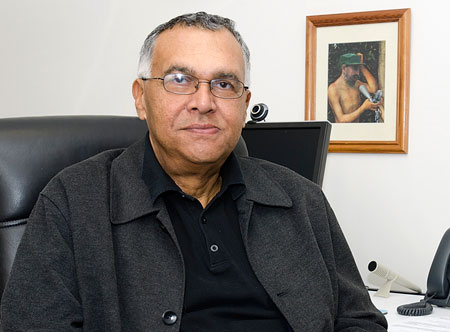Spanish Professor Examines Opportunities In Cuba In Relation To His History There
Dec. 20, 2011
SHSU Media Contact: Amy Barnett
 Signs of economic and social reform have made headlines in the U.S. and across the globe as the island nation of Cuba experiments with expanded civil liberties and a revising political system.
Signs of economic and social reform have made headlines in the U.S. and across the globe as the island nation of Cuba experiments with expanded civil liberties and a revising political system.
The country that had been “left behind” under the 50-year rule of Fidel Castro is now allowing its citizens to own cell phones, cars and even houses; that is, if they can afford what are still considered luxuries in the communist country.
The changes have been gradual but considered revolutionary under the leadership of Raul Castro, who has been president since 2008 when his brother stepped down due to illness. Raul Castro has also allowed Cubans to open small businesses as the country reduces its government workforce by a half million.
Although critics are skeptical that the country’s trial run with capitalism will expand beyond its initial changes, others see it as the first step in a vast transformation in Cuban society.
In early 2011, President Barack Obama eased travel restrictions for American students and church groups, presenting college students an opportunity to study abroad in Cuba for the first time since 2004, when President George W. Bush halted nearly all American academic travel to the country.
The ruling, which did not require congressional approval, is being considered the first major step since President Bill Clinton allowed humanitarian aid in Cuba in 2000 to loosen the more than 50-year embargo put into place in 1960.
While many American educators support the move by the Obama Administration, the ruling has its skeptics, including Sam Houston State University Spanish professor Rafael Saumell-Munoz.
“Education in Cuba is controlled totally by the government. If they were to send a Cuban student to the U.S. in an exchange program, they would send only students who are trusted, so it would be another political act, and the American student visiting Cuba would be seen as a political act,” said Saumell. “That is not the intention.”
Saumell’s interest in Cuba isn’t just professional; it’s also personal.
Saumell was born in Havana, Cuba, in the 1950s. Soon after his mother died from cancer came the revolution of Fidel Castro. Saumell’s father joined the Guerilla movement and moved into the mountains to fight the regime, leaving Saumell in Guantanamo to be raised by his aunts. After completing what is equivalent to high school in the U.S., Saumell went to the University of Havana and earned a degree in French linguistics.
His education led him to a career he loved in radio and television. Saumell first worked as a writer for a radio station in Cuba and then became a director and producer of an extremely popular televised singing competition, Todo el Mundo Canta, which he said was very similar to American Idol.
As he worked and advanced in his career, which was controlled by the government like all jobs in Cuba, he also began writing a collection of short stories. After presenting the stories to a publishing house, also run by the government, he was arrested and imprisoned for five years, because his writings were deemed “counterrevolutionary.”
One of the stories was about a government officer with an impeccable political career who secretly did not think well of the government, and when he got the opportunity to go abroad, he did.
“I knew the stories would cause debate, but I never thought I’d be arrested, fired from work, and become what they called a counterrevolutionary prisoner,” Saumell said.
Once he was released from prison in 1986, Saumell could not get a job because the Cuban government was the country’s only employer. He collected recyclable items to support his family and learned to be an exterminator. All the while, he continued to write.
After an arranged meeting by a U.S. diplomat with NBC’s Maria Shriver in 1988, who had traveled to Cuba on assignment for the Today Show, the United States government offered Saumell, his wife and two children visas and the family moved to St. Louis, Mo.
There, Saumell went to Washington University and earned his doctorate in Spanish. In 1992, Sam Houston State University offered him a teaching position in the department of foreign languages.
Since President Obama’s recent move allowing academic travel to Cuba, Saumell said as far as he knows, there has been only one student inquire about the opportunity, and at this point, SHSU does not have a program supporting it. When that changes, he said he would strongly support it, even though he questions the relevance.
“Cuba is not changing. As long as you see Castro’s last name attached to the most important political job, there’s no real change,” Saumell said. “There may be new nuances, but change like having an African-American president here will not happen.
“At least American students will have an opportunity to learn from a different culture, learn a different language and view a different political system,” he said. “They can make their own conclusions.”
Even though Saumell still has family in Cuba, he said he would not return even if allowed, because he said he would have to do it with his mouth shut.
“If Sam Houston creates a program and wants to send a professor to Cuba, I will not go until there is a person with a name other than Castro in charge,” he said. “And then I still wouldn’t go on the first plane…maybe the second or third.”
- END -
This page maintained by SHSU's Communications Office
Associate Director: Julia May
Manager: Jennifer Gauntt
Located in the 115 Administration Building
Telephone: 936.294.1836; Fax: 936.294.1834
Please send comments, corrections, news tips to Today@Sam.edu.

 SamWeb
SamWeb My Sam
My Sam E-mail
E-mail

